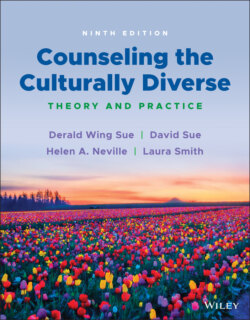Читать книгу Counseling the Culturally Diverse - Laura Smith L. - Страница 16
CHAPTER 1 Understanding Resistance to Multicultural Training: Obstacles to Developing Cultural Competence CHAPTER OBJECTIVES
Оглавление1 Acknowledge and understand personal resistance to multicultural training.
2 Identify how emotional reactions to topics of prejudice, discrimination, and oppression can act as obstacles to developing cultural competence and cultural humility.
3 Understand worldview differences between majority and socially devalued group members in U.S. society.
4 Make sense of why majority group members often react differently from marginalized group members when issues of racism, sexism, or heterosexism are discussed.
5 Be cognizant of how worldviews may influence the ability to understand, empathize, and work effectively with diverse clients.
6 Realize that becoming an effective multicultural counselor or therapist is a lifelong journey.
Video: “Emotional Reactions to Counseling the Culturally Diverse: An Interview with Derald Wing Sue”
Reading and digesting the content of this book may prove difficult and filled with powerful feelings for many of you. Some readers find the substance of the book difficult to absorb and have reacted very strongly to the content. According to instructors of multicultural counseling and therapy (MCT) classes, the powerful feelings aroused in some students prevent them from being open to diversity issues, and from making classroom discussions on the topic a learning opportunity. Instead, conversations on diversity become “shouting matches” or become monologues rather than dialogues. These instructors indicate that the content of the book challenges many White students about their racial, gender, sexual orientation and gender identity realities, and that the book's socio/cultural/political orientation also arouses deep feelings of defensiveness, anger, anxiety, guilt, sadness, hopelessness, and a multitude of other strong emotions. As you begin the course, it is important to know that multicultural psychology is much more than an intellectual exercise. It is also a journey of self‐discovery, filled with deep feelings about the subject matter, and often‐uncomfortable personal revelations.
Students who have embarked on a journey to understand MCT and multicultural mental health issues have almost universally felt both positive and negative feelings that affect their ability to learn about diversity issues. As you begin your journey to becoming a culturally competent or culturally responsive counselor/mental health professional, the road is often filled with obstacles to self‐exploration, to understanding yourself as a racial/cultural being, and to understanding the worldview of those who differ from you in race, gender, ethnicity, sexual orientation or identity, and other sociodemographic group characteristics.
We begin by sharing with you reactions by fellow classmates about their starting expectations for the course, and then their initial reactions to the content of Counseling the Culturally Diverse.
